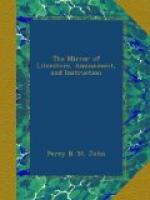Lord Bacon has truly observed, “A garden is the purest of all human pleasures,” and no doubt he felt its influence, when he returned from the turmoil of a court and courts. Many of his writings were composed under the shade of the trees in Gray’s Inn Gardens; he lived in a house facing the great gates, forming the entrance to the gardens, and Sir Fulke Greville, Lord Brook,[3] frequently sent him “home-brewed beer.” Epicurus, the patron of refined pleasure, fixed the seat of his enjoyment in a garden. Dr. Knox says, “In almost every description of the seats of the blessed, ideas of a garden seem to have predominated. The word paradise itself is synonymous with garden. The fields of Elysium, that sweet region of poesy, are adorned with all that imagination can conceive to be delightful. Some of the most pleasing passages of Milton are those in which he represents the happy pair engaged in cultivating their blissful abode. Poets have always been delighted with the beauties of a garden. Lucan is represented by Juvenal as reposing in his garden. Virgil’s Georgies prove him to have been captivated with rural scenes; though to the surprise of his readers he has not assigned a book to the subject of a garden. But let not the rich suppose they have appropriated the pleasures of a garden. The possessor of an acre, or a smaller portion, may receive a real pleasure from observing the progress of vegetation, even in the plantation of culinary plants. A very limited tract properly attended to, will furnish ample employment for an individual, nor let it be thought a mean care; for the same hand that raised the cedar, formed the hyssop on the wall.”
P.T.W.
[3] In the street called Brook Street, was Brook House.
* * * * *
GRECIAN FLIES—SPONGERS.
(For the Mirror.)
In modern days we should term Grecian Flies, Spongers; alias Dinner Hunters. Among the Grecians (according to Potter) “They who forced themselves into other men’s entertainments, were called flies, which was a general name of reproach for such as insinuated themselves into any company where they were not welcome.” In Plautus, an entertainment free from unwelcome guests is called hospitium sine muscis, an entertainment without flies; and in another place of the same author, an inquisitive and busy man, who pries and insinuates himself into the secrets of others, is termed musca. We are likewise informed by Horus Apollo, that in Egypt a fly was the hieroglyphic of an impudent man, because that insect being beaten away, still returns again; on which account it is that Homer makes it an emblem of courage.
P.T.W.
* * * * *
THE SELECTOR; AND LITERARY NOTICES OF NEW WORKS.
* * * * *




